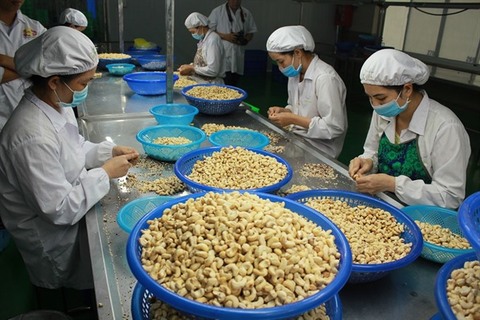
It is critical to enhance the awareness of businesses about non-tariff measures and build the capacity to tackle invisible trade barriers. — Photo cafef.vn
It is critical to enhance the awareness of businesses about non-tariff measures and build the capacity to tackle invisible trade barriers, experts have said.
According to Hoang Minh Chien, deputy director of the Viet Nam Trade Promotion Agency under the Ministry of Industry and Trade, through Viet Nam’s free trade agreements, firms would have opportunities to expand exports but also face non-tariff barriers to trade.
“Thoroughly understanding non-tariff measures of export markets is key for businesses to promote trade,” Chien said.
Chien said most domestic enterprises were small and medium sized with limited capacity and insufficient understanding about invisible barriers, so they would face several difficulties when exporting.
“Firms must be provided with support to build enough capacity to overcome non-tariff measures,” he said.
Common non-tariff measures used by countries around the world included sanitary and phytosanitary measures, technical barriers to trade, pre-shipment inspections and other formalities, non-automatic licensing and quotas and rules on product origin.
According to Alain Chevalier, senior trade promotion adviser at the Viet Nam Trade Promotion Agency, some 90 per cent firms in Viet Nam are small and medium sized and only 10 per cent of them have capacity for direct exporting, while others must export via intermediaries or produce following the orders of exporters.
He pointed out that small and medium sized enterprises (SMEs) had several limitations such as limited financial capacity, limited capacity to access capital and new technologies, a lack of market research and weak management capacity, and few of them were engaging in global value chains.
Their capacity to understand and overcome non-tariff measures was still low and would encounter several challenges in integration, he said.
Chevalier said that was necessary to equip firms with knowledge about non-tariff measures and build capacity to overcome them.
According to Nguyen Thi Xuan Thuy from the Ministry of Industry and Trade, rules of origin was the non-tariff measure firms must pay the most attention to because meeting these rules would help them to enjoy preferential tariffs via FTAs.
Thuy said firms should also study non-tariff measures used in their export markets to compare costs for meeting non-tariff measures and benefits from tariff cuts in FTAs.
According to Thuy, policymakers should study the impacts of non-tariff measures in Viet Nam to cut costs for businesses.
In addition, support must be provided to firms about market information and knowledge about non-tariff measures and ways to tackle these barriers to trade, she said.
In an effort to enhance awareness of organisations and enterprises about non-tariff measures in international trade, the Viet Nam Trade Promotion Agency and the International Trade Centre on Wednesday held a workshop on tackling the invisible barriers to trade titled: ‘Non-tariff barriers project in Viet Nam’.
The project will be implemented in 2019-20 and focus on surveying firms about non-tariff measures, working with relevant parties to study measures to tackle existing trade barriers and reduce costs in trade, building capacity to cope with non-tariff measures for policy-makers, trade organisations and SMEs, and enhancing transparency in non-tariff measures. — VNS